How to Start a Food Truck Business in Charleston, SC
Learn how to start a food truck business in Charleston, South Carolina with this step-by-step guide. Get the details on permits, licenses and parking.
loading...

With its growing amount of tourism, Charleston is becoming a hotspot for food trucks.
Why is Charleston a Great Market for Food Trucks?
The Checklist for Starting a Food Truck in Charleston, South Carolina
Step 1: Develop a Solid Business Plan for Your Food Truck in Charleston
Step 2: Get Your Employer Identification Number (EIN)
Step 3: Choose the Right Legal Structure for Your Food Truck in Charleston
Step 4: Secure the Right Insurance for Your Food Truck in Charleston
Step 5: Obtain the Necessary Licenses and Permits to Operate Your Food Truck in Charleston
Step 6: Secure Approved Parking and Sales Locations for Your Food Truck in Charleston
Step 8: Handle Trash and Waste
Step 9: Manage Electricity and Water
Every successful food truck started with a first step — and yours begins right here in Charleston. If you are serious about launching, this guide will walk you through how to start a food truck business in Charleston from start to finish.
Charleston has a strong food culture, a large tourism industry, and many local events that welcome food trucks.
However, the city also has strict requirements for permits, licenses, and where food trucks in Charleston can operate. This makes it important to understand exactly how to start a food truck in Charleston before you invest any money.
This guide covers every step — from creating a business plan to getting your licenses, finding a truck, handling inspections, securing parking, and finally opening for sales.
It will also explain how to get a food truck license in Charleston and what fees and timelines you should expect.
By the end, you will know exactly what you need to do to turn your idea into a working business.
So, let’s get started!

The charm of Charleston lies in its rich culinary scene and vibrant culture, making it an ideal location for food trucks.
Why is Charleston a Great Market for Food Trucks? (top)
Charleston’s food truck scene has been growing fast over the last few years. With warm weather for most of the year and a strong local food culture, it’s a great place to start a mobile food business.
In fact, tourism in Charleston hit over 7.8 million visitors in 2023 alone, with an even busier tourism season projected in 2025, which means there are always new customers looking for good food on the go.
There are also lots of events, markets, and festivals where food trucks are welcome. This gives food truck owners many chances to build a steady flow of business.
At the same time, it's important to know that Charleston has strict rules for food trucks. The city government watches things closely, so you must stay on top of your permits, inspections, and where you are allowed to park.
Parking spaces for food trucks are limited, which can make planning ahead very important.
Even with these challenges, Charleston can still be a very profitable place to launch your food truck.
If you stay organized and follow the steps, you'll have a good shot at building a strong business here.
The Checklist for Starting a Food Truck in Charleston, South Carolina (top)
Charleston is a city full of opportunity for food truck owners, but getting started with how to start a food truck in Charleston can feel overwhelming if you don't know the local process.
There are clear steps you need to follow to get legal, stay compliant, and launch with confidence.
This checklist breaks it all down in a simple, clear way — so you can spend less time guessing and more time getting your truck on the road.
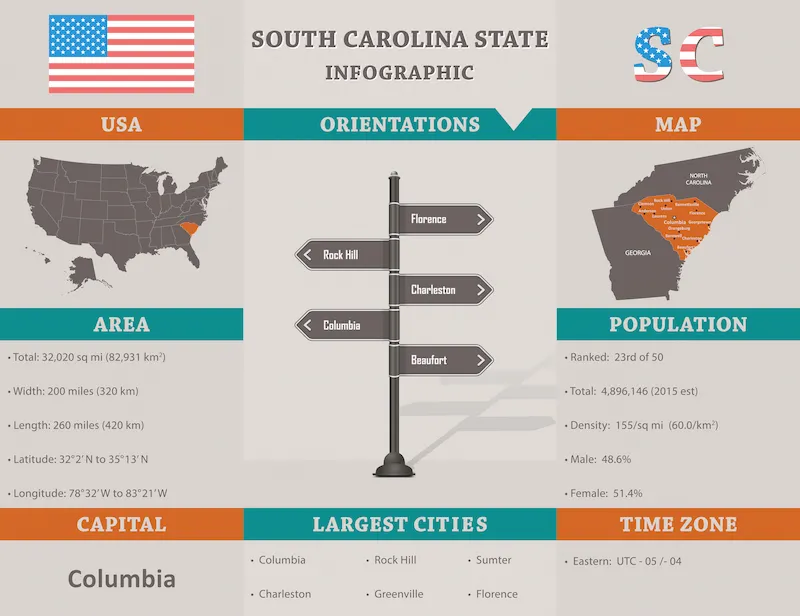
As one of the largest cities in South Carolina, Charleston offers a unique market for food trucks.
Step 1: Develop a Solid Business Plan for Your Food Truck in Charleston (top)
Before you get started, it's important to have a business plan in place.
It doesn't need to be long or complicated, but it should cover these key areas:
1. Know Who You're Serving
Think about who your customers are. Are they locals, tourists, or event-goers? Understanding your audience will help you plan your menu, set prices, and figure out how to reach them.
2. Create Your Menu and Set Fair Prices
Decide what you'll serve and how much you'll charge. Keep your menu simple enough to prepare quickly in a small truck, and set prices that balance your costs with what customers are willing to pay.
3. Estimate Your Startup Costs
Figure out how much you’ll need to get started. This includes buying or renting a truck, equipment, permits, and supplies. It’s important to know what your initial investment will be, so you’re not caught off guard.
4. Plan for Your Ongoing Expenses
Think about the regular costs you'll face — things like food, fuel, insurance, and staff wages. Knowing these will help you manage your cash flow and make sure you’re covering your expenses.
5. Decide How You’ll Market Your Truck
How will you get the word out? Whether it’s through social media, local events, or partnerships with other businesses, having a clear marketing strategy will help you build your customer base.
6. Set Achievable Goals for Your First Year
Define what success looks like for your first year. Whether it’s hitting a certain sales number or building a loyal following, having goals will keep you focused and help you track progress.
Step 2: Get Your Employer Identification Number (EIN) (top)
Next, you’ll need an Employer Identification Number (EIN) from the IRS.
Getting your EIN is quick and important for running a legitimate food truck business in Charleston. This number is essential for tax purposes, hiring employees, and opening a business bank account.
Why You Need an EIN
An EIN is like a Social Security number for your business. It's required if you have employees or operate as a partnership or corporation.
How to Apply
Applying for an EIN is free and easy. Visit the IRS website to apply online: IRS EIN Application. Once you submit the form, you'll get your EIN immediately.
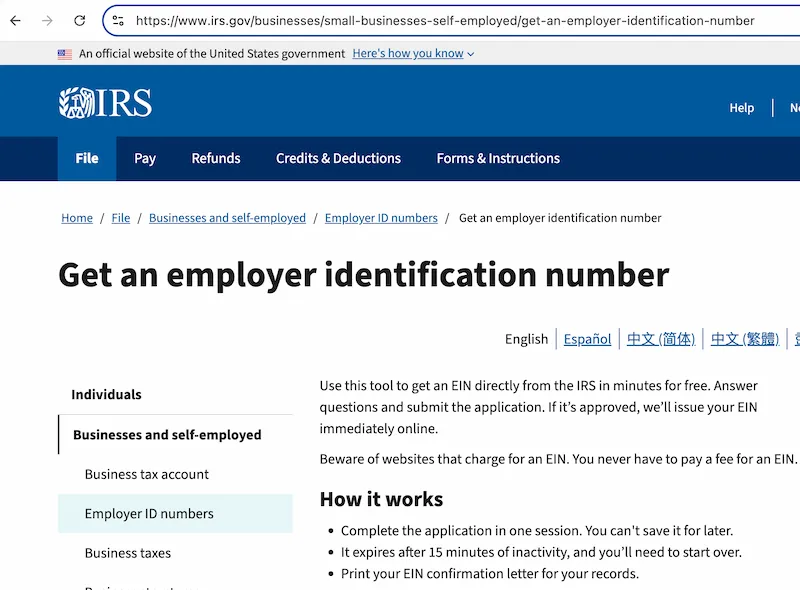
What You Need
Have your business name, address, and the responsible party’s Social Security Number ready when applying.
Step 3: Choose the Right Legal Structure for Your Food Truck in Charleston (top)
Selecting the appropriate business structure is crucial when starting your food truck in Charleston. It affects your taxes, liability, and how you operate. Here are the main options:
1. Sole Proprietorship
This is the simplest form. If you're the only owner, you're automatically a sole proprietor. There's no need to register with the state. However, you're personally responsible for any debts or legal issues your business faces. This means your personal assets could be at risk.
2. Limited Liability Company (LLC)
An LLC is a popular choice for food truck owners. It separates your personal assets from your business liabilities, offering protection in case of legal issues. To establish an LLC, you must pay a $274 filing fee and file Articles of Organization with the South Carolina Secretary of State.
Additionally, LLCs must appoint a registered agent and may need an operating agreement. This structure provides flexibility in management and taxation.
3. Corporation
Corporations are more complex and suitable for businesses planning to raise capital or go public. They offer liability protection but come with more paperwork and potential double taxation—once at the corporate level and again when dividends are distributed to shareholders.
✅ Sole Proprietor: The simplest form, where you and the business are the same legally.
✅ Limited Liability Company (LLC): A separate legal entity that protects your personal assets.
✅ Corporation: A more complex structure, taxed separately from its owners.
Choosing the Best Option
For most food truck entrepreneurs in Charleston, choosing a business entity that favors the separation of business assets from personal assets is worth a second look.
Balancing liability protection with manageable administrative requirements is a goal that should be covered early in the business planning phase.
Consider your long-term goals and consult with a legal or financial advisor to determine the best structure for your specific situation.
Step 4: Secure the Right Insurance for Your Food Truck in Charleston (top)
Before you hit the streets of Charleston with your food truck, it's essential to have the proper insurance coverage.
This not only protects your business but also ensures compliance with local regulations.
Why Insurance Matters
Operating a food truck involves risks, from accidents to foodborne illnesses. Insurance covers financial losses if anything goes wrong.
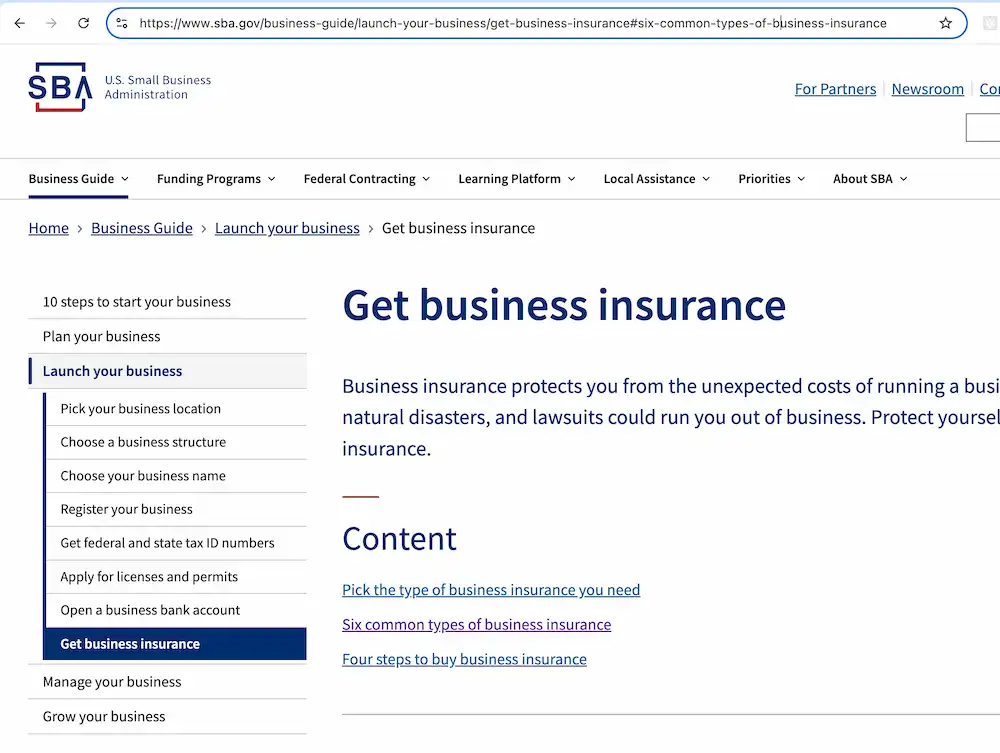
Be sure to check out the Small Business Administration (SBA) website as a resource for food truck insurance options and other business resources: sba.gov
Key Coverage Types
1. Commercial Auto Insurance:
Covers accidents, theft, and damage to your truck and its equipment. Personal car insurance won’t work for business use.
2. General Liability Insurance:
Protects against claims like customer injuries or property damage near your truck.
3. Product Liability Insurance:
Covers claims related to foodborne illnesses or allergic reactions caused by your products.
4. Workers' Compensation Insurance:
Required if you have employees. It covers medical expenses and lost wages for work-related injuries.
5. Property Insurance:
Covers damage to your equipment and inventory, such as fire or theft.
6. Business Interruption Insurance:
Helps cover lost income if your operations are halted due to unforeseen events.
Cost of Insurance
On average, food truck insurance costs around $84 per month. The exact price depends on factors like your truck size and coverage needs.
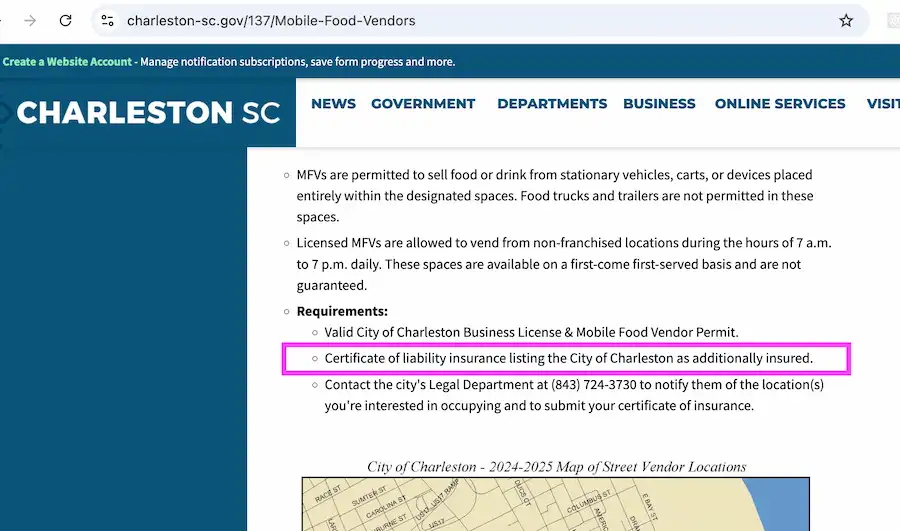
Be sure to list the City of Charleston as an additional insured on your policy.
Step 5: Obtain the Necessary Licenses and Permits to Operate Your Food Truck in Charleston (top)
Before you can start serving delicious food from your truck in Charleston, you’ll need to secure several essential licenses and permits.
Knowing how to get a food truck license in Charleston is one of the first things you should tackle.
Here’s a breakdown of what’s required:
1. City of Charleston Business License
Every business operating in Charleston, including food trucks, must obtain a business license.
The cost varies depending on your estimated revenue. You can apply for your business license through the South Carolina Business One Stop (SCBOS) website.
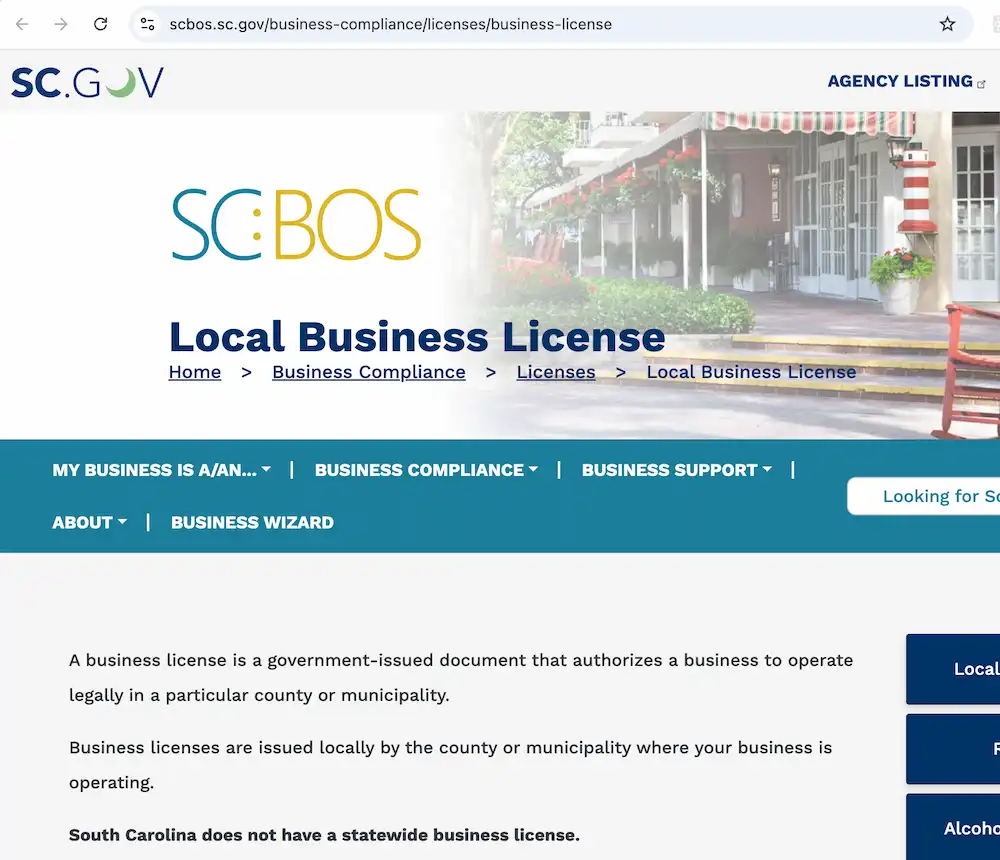
2. Mobile Food Vendor Permit
This permit is specific to mobile food vendors and ensures that your operation complies with local health and safety standards.
To obtain it, you'll need to:
✅ Submit a completed Mobile Food Vendor Permit Application. In the search bar, type "Mobile Food Vendor Permit" to find the application form.
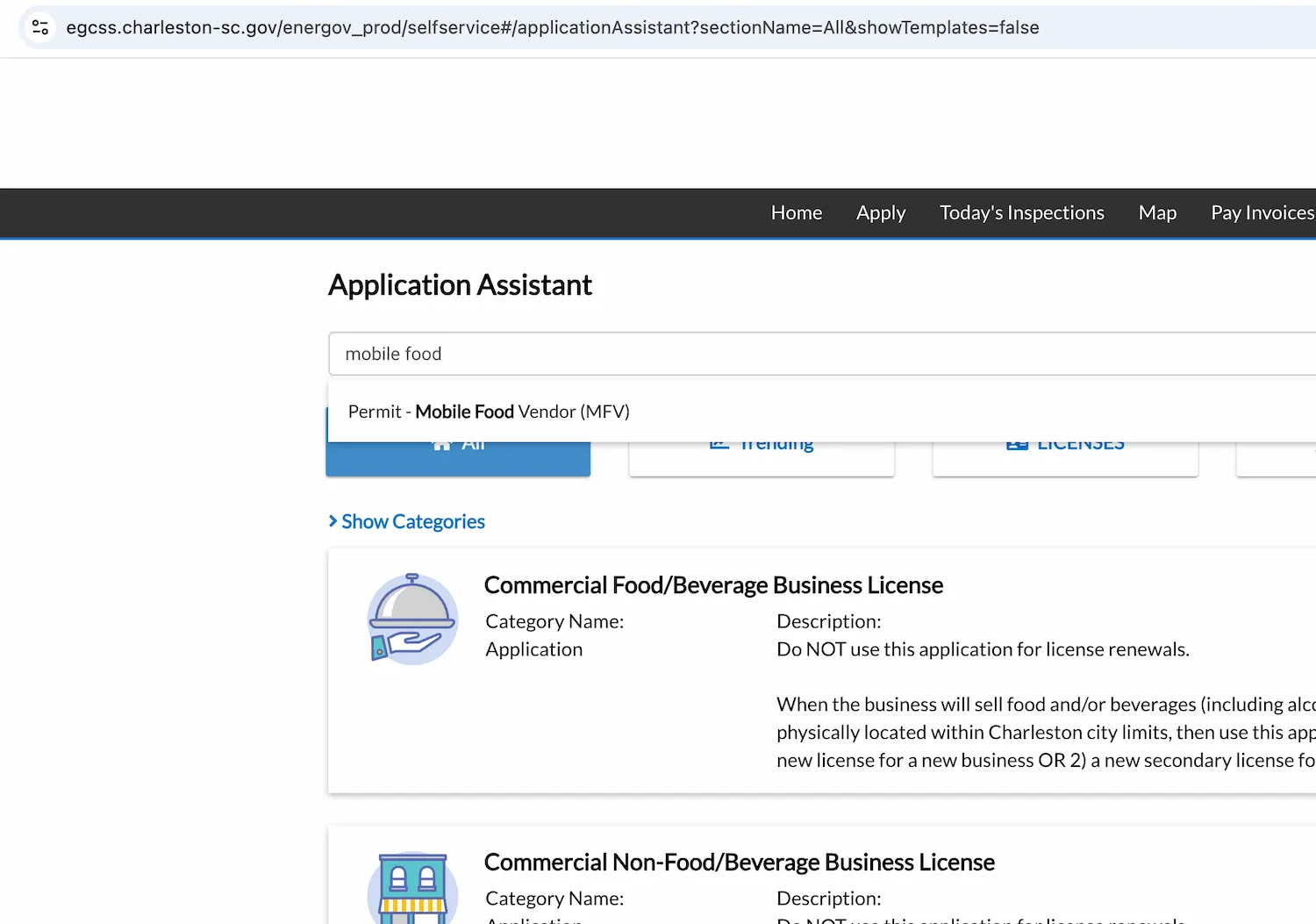
Choose Permit – Mobile Food Vendor from the dropdown menu.
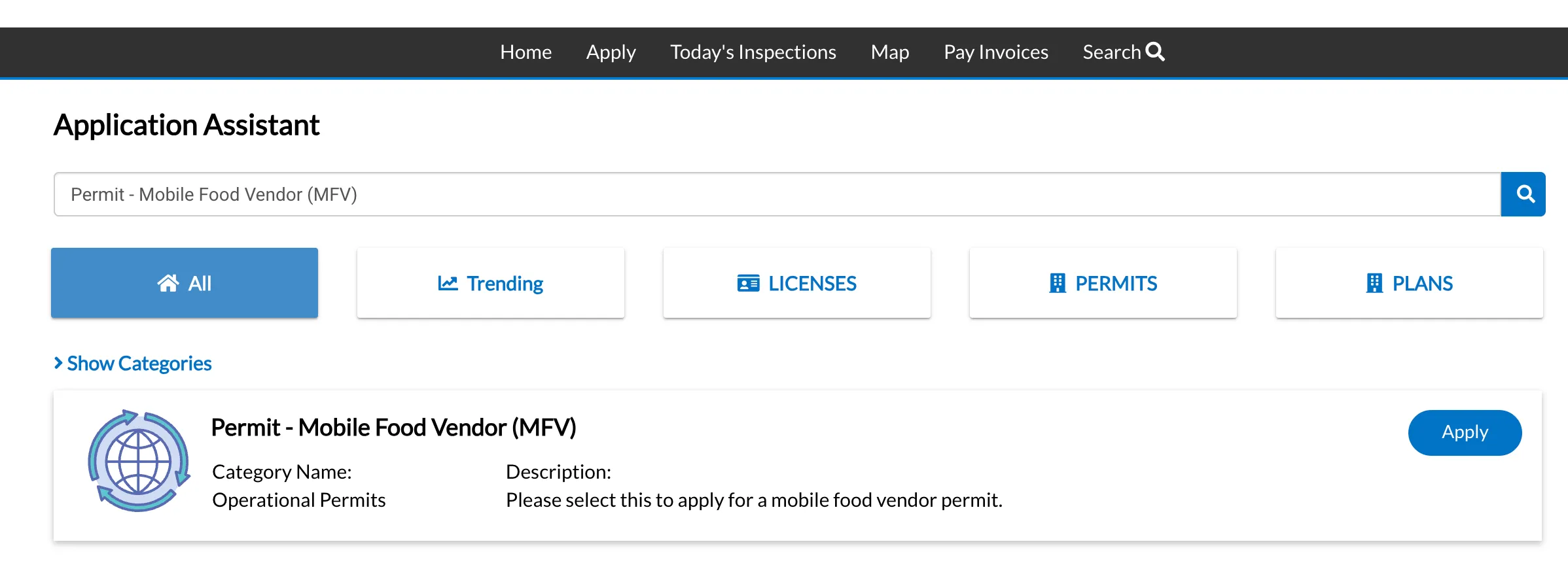
✅ Pass a fire and safety inspection.
✅ Pay the applicable fees.
The permit is valid for 12 months and must be renewed annually.

3. South Carolina Retail License
Issued by the South Carolina Department of Revenue, this license allows you to collect sales tax on the food and beverages you sell. The application fee is $100.
4. Health Permit
To ensure food safety, the South Carolina Department of Health and Environmental Control (DHEC) requires that your food truck passes a health inspection.
This includes a review of your food handling, preparation, and storage practices. You'll need to submit an application and schedule an inspection.
The health permit fee for a food truck in South Carolina typically ranges from $100 to $1,000, depending on your projected sales.
5. Fire Department Inspection
Your food truck must undergo a fire safety inspection to ensure compliance with local fire codes. This inspection typically takes place at 2 George Street in Charleston.
Upon passing, you'll receive a permit sticker valid for 12 months.
6. Hospitality Tax License
If you sell prepared food, you're required to collect hospitality taxes. This license is necessary for compliance with local tax regulations.
You can apply for it through the South Carolina Department of Revenue.
7. Special Event Permits
If you plan to operate at special events, such as festivals or markets, you may need additional permits.
For instance, Charleston County Parks and Recreation requires food vendors to apply for a permit and pay a base fee of $250 for a 10-foot space.
Note: The application and approval process for these licenses and permits can take 2-8 weeks. It's advisable to start the process well in advance of your planned launch date to ensure all requirements are met.
Step 6: Secure Approved Parking and Sales Locations for Your Food Truck in Charleston (top)
In Charleston, you can't just park your food truck anywhere.
To operate legally, you must secure approved locations, either on private property with the owner's consent or at designated public spaces.
Remember, operating without proper authorization can result in fines or shutdowns. Always secure the necessary permissions before setting up your food truck.
✅ Private Property
To vend on private property, obtain written approval from the property owner. Then, apply for a Business License Certificate of Occupancy through the City of Charleston's Revenue Collections Division. This process ensures your business complies with zoning, fire, and building codes.
✅ Public Spaces
Selling food on public streets is restricted to designated areas. Food trucks are not permitted to conduct business in the public right-of-way in the City of Charleston limits. However, there are designated vending locations where food trucks can operate.
✅ Special Events
Participating in special events requires additional permits. You must apply for a Special Event Permit through the City of Charleston's Special Events Office. This ensures your participation complies with city regulations and event guidelines.
Step 7: Build Your Crew (top)
At minimum, plan for 2 people:
🔥 One to cook
🔥 One to serve and handle payments
For busy times, you may need a third person to prep food or clean up.

Plan on at least a two-person crew for your Charleston food truck.
Step 8: Handle Trash and Waste (top)
Food trucks must manage their trash properly:
✅ Bring your own trash bins.
✅ Empty them at approved waste sites.
✅ You may need contracts with private waste companies for bigger jobs.
Step 9: Manage Electricity and Water (top)
Your food truck must have:
Some event sites offer hookups, but most food trucks rely on their own equipment. Plan fuel and water refills into your daily prep time.
Step 10: (Optional) Add Seating (top)
It’s a nice extra touch. Many trucks bring 2–4 foldable tables and a few plastic chairs.
Small investments like this (under $200) can boost your customers' experience if space allows.
Final Thoughts (top)
If you want to know how to start a food truck business in Charleston, just remember: it is all about good planning.
The city has strict rules, but the opportunities are real if you can follow the process.
Focus first on paperwork, finding the right truck, and getting legal.
Expect everything to take 3 to 6 months if starting from scratch.
Once you are rolling, Charleston’s love for good food and outdoor events will be waiting for you.

We ❤️ Charleston!
©2025 Cocina Digital Hospitality Group, Inc. All rights reserved.
No part of this publication may be reproduced, stored in a retrieval system, or transmitted in any form or by any means, electronic, mechanical, photocopying, recording, or otherwise, without the prior written permission of the publisher.
We use cookies to enable you to use our site, understand how you use our site, and improve your overall experience.
Cookies allow us to personalize content, track which pages are most popular and least popular, and provide advertising that may be relevant to you.
Please note that cookies that are essential to the proper functioning of the site are required and cannot be disabled.
They are usually only set in response to actions made by you which amount to remembering your settings, a request for services, such as setting your privacy preferences, logging in, or filling in forms.
As such, they are the only cookies that are enabled by default.
You can set your browser to block or alert you about these cookies.
By continuing to use our site, you accept our use of cookies.